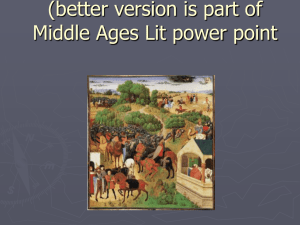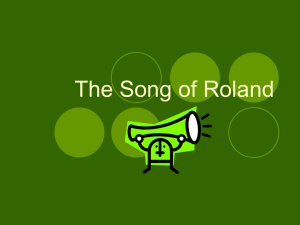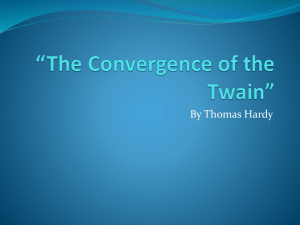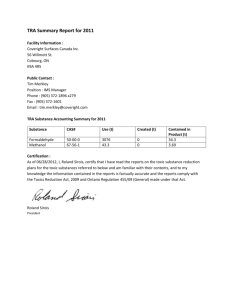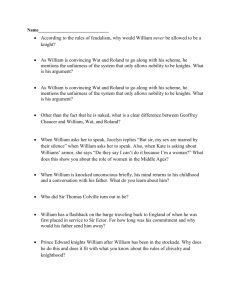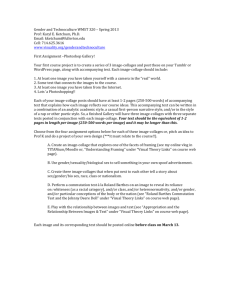Robert Browning & Thomas Hardy
advertisement
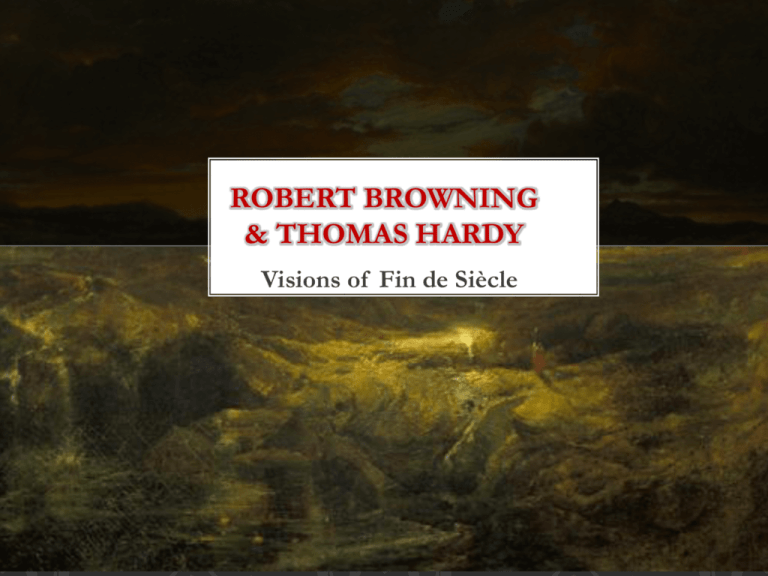
ROBERT BROWNING & THOMAS HARDY Visions of Fin de Siècle OUTLINE 1. Introduction: Quest & Anti-Quest 2. “Childe Roland to the Dark Tower Came” 3. “The Convergence of the Twain” 4. Next Time: Alice in Wonderland QUEST & ANTIQUEST Quest (M-W Dictionary) 1: a journey made in search of something; 2: a long and difficult effort to find or do something 3: [literature]a chivalrous enterprise in medieval romance usually involving an adventurous journey (for the Holy Grail or rescuing a lady in distress) Romantic Quest –for Nature, Love, Art and Individual Freedom • One with Nature Wordsworth Wordsworth • Strengths & Pleasing thoughts in memories • Primal Sympathy; with still sad music of humanity Wordsworth Art, Nature, Love and Individualism Coleridge, etc. • Nature & the Supernatur al sublime Byron, Shelley, Keats • Romantic Love Byron • Byronic Hero, transcen ding human boundar ies Keats & Shelley • Artistic Immortality vs. Human Mortality EXPRESSION OF DOUBTS In Memoriam I Be near me when the sensuous frame Is rack'd with pangs that conquer trust; And Time, a maniac scattering dust, And Life, a Fury slinging flame. Be near me when my faith is dry, And men the flies of latter spring, That lay their eggs, and sting and sing And weave their petty cells and die. EXPRESSION OF DOUBTS LIV Oh yet we trust that somehow good Will be the final goal of ill, To pangs of nature, sins of will, Defects of doubt, and taints of blood; …Behold, we know not anything; I can but trust that good shall fall At last—far off—at last, to all, And every winter change to spring. So runs my dream: but what am I? An infant crying in the night: An infant crying for the light: And with no language but a cry. EXPRESSION OF DOUBTS LVI 'So careful of the type?' but no. From scarped cliff and quarried stone She cries, `A thousand types are gone: I care for nothing, all shall go. …And he, shall he, Man, her last work, who seem'd so fair, Such splendid purpose in his eyes, Who roll'd the psalm to wintry skies, Who built him fanes of fruitless prayer, Who trusted God was love indeed And love Creation's final law— Tho' Nature, red in tooth and claw With ravine, shriek'd against his creed— …Be blown about the desert dust, Or seal'd within the iron hills? …Behind the veil, behind the veil. VICTORIAN ANTIQUEST Victorian Nature Anti-Quest -- Nature desolate “Childe Roland” Alice’s “Garden” Love Artistic Vision Jane Eyre – marriage Pre-Raphaelitism – Medievalism Aestheticism – Art for Art’s Sake Individual Freedom NO Quest or – Women and Men in Journey waiting or death “Mariana” “Tinthonus” “Song” “Shalott” “Childe Roland” Alice’s Adventure Robert Browning (1812 –1889) CHILDE ROLAND TO THE DARK TOWER CAME Childe Roland to the Dark Tower Came painted by Thomas Moran in 1859 (Wikipedia) “CHILDE ROLAND” - BACKGROUND 1) Title: from Shakspeare’s King Lear. In the play, Gloucester's son, Edgar, lends credence to his disguise as Tom o' Bedlam by talking nonsense, of which this is a part: Child Rowland to the dark tower came, His word was still 'Fie, foh, and fum I smell the blood of a British man. King Lear, Act 3, scene 4 (Wikipedia) 2) Browning: ``Childe Roland …`came upon me as a kind of dream. I had to write it, then and there, and I finished it the same day, I believe. But it was simply that I had to do it. I did not know then what I meant beyond that, and I'm sure I don't know now.'‘ (qtd Korg) “CHILDE ROLAND” - BACKGROUND 3) Is the poem’s moral “he that endureth to the end shall be saved”? “Yes, just about that” (qtd Poston 437) . Browning denies identification with his monologuist at one point, but admits having “his true person” in all of them (Poston 438) . CHILDE ROLAND: SUMMARY1-FOLLOW THE CRIPPLE’S SUGGESTION Stanza Main Ideas 1 The cripple lied; he suppressed his glee in find one more victim in me. [Why follows his suggestion?] 2 The cripple: “skull-like” laugh and writes my epitaph for fun. 3 I turned onto the track he suggested, feeling neither pride nor hope about the end of the journey. 4 My hope dwindled into a ghost; I expected failure. 5-6 I am like a dying man … hearing the others saying good7 bye and arranging my funeral. [“Forbidding Mourning”] I had suffered in this quest and heard failure foretold (like the others in the Band). CHILDE ROLAND: SUMMARY-2 NATURE &A HORSE Stanza 8 9 10 11 12 13 14 Main Ideas I took the path in a dreary sunset. The safe road vanished as soon as I took the turn, with only a grey plain surrounding me. “starved ignoble” nature described. Penury, inertness, grimace Nature: “I cannot help my case.” It’s the last judgment. The thistle-stalk that rises above its maters has its head chopped; the bents “jealous.” What made these holes and rents in the leaves which deny greenness? A brute pashing their lives out… [denial of individualism] Grass—scant as “hair in leprosy”; a stiff blind horse The horse: I never saw a brute I hated so. CHILDE ROLAND: SUMMARY-3 THE PAST VS. THE PRESENT Stanza Main Ideas 15 I turned my eyes inward and tried to remember some heroic past. 16 But no– I saw Cuthbert’s reddening face …”one night’s disgrace” leaves my heart cold 17 18 Giles – honest man turned to traitor 19 Better this present –in the darkening path. Something arrest smy thoughts. A river appears like a serpant– bath for the fiend… 20 So petty yet so spiteful! The trees along it are “suicidal” 21 Walking thru’ the river, I “set my foot upon a dead man's cheek” CHILDE ROLAND: SUMMARY-4 LANDSCAPE OF WAR & DESTRUCTION Stanza Main Ideas 22 Not a better country on the other bank: with strugglers in war, “Toads in a poisoned tank,/Or wild cats in a red-hot iron cage” [images of torture] 23 24 More images of war and torture “Christians against Jews.” 25 Nature reduced to its elements: “now mere earth Desperate and done with; …Bog, clay and rubble, sand and stark black dearth. “ Nature reduced to its elements: Now patches where some leanness of the soil's/Broke into moss or substances like boils; 26 More images of war and torture “wheel,/Or brake, not wheel that harrow fit to reel/Men's bodies out like silk?” CHILDE ROLAND: SUMMARY-5 ENDING? 27 And just as far as ever from the end! -- a black bird as the guide 28 Plains give way to mountains: Mere ugly heights and heaps now stolen in view.” –[Prelude: stolen boat scene] 29 Near despair, Roland finds himself “inside the den” 30 Burningly it came on me all at once, with mountains on its side… Calls himself “Dotard” 31 The tower described -- 32 Not see? The hills are like “giants at a hunting” announcing his killing Not hear? “Lost, lost! one moment knelled the woe of years.” 34 I announced my arrival A bur r (毛刺) had been a t r e a s u r e - t r ove . … c o ck l e ( 蜊 ) , s p u r g e ( 大 戟 ) Might propagage their kind… CHILDE ROLAND: DISCUSSION QUESTIONS 1. Lilian -- How is Nature described? With images of torment, punishment and disease? Personified? With its broken parts taking human attibutes? “horse, his every bone a-stare”; oak with “a cleft in him/Like a distorted mouth”; tower with “turret, blind as the fool's heart,” 2. David -- What can be the symbolic meanings of an old blind horse, a rusty wheel (that seems to be an instrument of torture), and a black bird (that Roland takes as an omen of death)? 3. Cindy Chang -- Do we get to understand Roland through this dramatic monologue (as we do the Duke thru’ “My Last Duchess”)? Is his a mental journey? 4. Delilah -- Or maybe the poem is an allegory of the age? CHILDE ROLAND: POSSIBLE INTERPRETATIONS 1. Journey: -- a quest in fin de siècle for something unknown—a circular and non-stop quest; -- for poetic career, only Nature is no longer inspiring; -- a quest for self-knowledge. 2. Roland’s last act: an “inner victory through endurance and self-discipline” (Korg), or that of acknowledging defeat and death. Last stanza -There they stood, ranged along the hill-sides, met To view the last of me, a living frame For one more picture! in a sheet of flame I saw them and I knew them all. And yet Dauntless the slug-horn to my lips I set, And blew. 'Childe Roland to the Dark Tower came.' “CONVERGENCE OF THE TWAIN” (Lines on the loss of the "Titanic") Thomas Hardy 1840–1928 THOMAS HARDY 1. 2. 3. 4. 5. 6. Famous for his novels such as Tess of the d'Urbervilles and Jude the Obscure Hardy turned to poetry because of the criticism on his novels, "The Darkling Thrush“ (1900)—”elegy for the nineteenth century”; --(skylark, nightingale "an aged thrush, frail, gaunt, and small.“) "Neutral Tones'" and "A Broken Appointment“– about failed love. "Ah, Are You Digging On My Grave" “Hap” And why unblooms the best hope ever sown? --Crass Casualty obstructs the sun and rain, And dicing Time for gladness casts a moan.... These purblind Doomsters had as readily strown Blisses about my pilgrimage as pain. “THE CONVERGENCE OF THE TWAIN” 1. “Convergence” (1915) -- The Titanic was a luxurious ocean liner that sank on April 14, 1912. The ship had been proclaimed unsinkable due to a number of safety features— including a series of closeable watertight compartments. It was quite unexpected when it was learned that the ship encountered an iceberg in the North Atlantic at 11:40pm during its maiden voyage. Over 1500 people lost their lives in the tragedy. (reference) 2. 3. Form: three-line stanza – tercet in the shape of the ocean liner. “Hardy was asked to write a poem to be read at a charity concert to raise funds in aid of the tragedy disaster fund. It was first published as part of the souvenir program for that event.” (Wikipedia) Is it a sympathetic poem? An elegy? “THE CONVERGENCE OF THE TWAIN” 1. 2. 3. 4. What tone does the speaker take? How and why are the Titanic and iceberg personified? Besides its being a sexual union, how does the poem explain this collision (or encounter) between human artifact and nature? (“The Immanent/Will that stirs and urges everything“; “Spinner of the Year”) And why? How does the poetic form convey its meanings? (tercet, inverted syntax, sets of opposites in stanzas 1-5; two long sentences in stanzas 6-11.) “THE CONVERGENCE OF THE TWAIN”: SUMMARY stanza 1 2 She lies deep in the sea, away from “human vanity” Steel chambers…turns to tidal lyres 3 sea-worm crawls (“grotesque, slimed, dumb, indifferent”) over mirrors Jewels – “lie lightless, all their sparkles bleared and black and blind.” 4 5. Dim moon-eyed fishes ask why she is here “THE CONVERGENCE OF THE TWAIN”: SUMMARY 2 stanza 6 7 8 9 10 11 While the “creature of cleaving wing” was being fashion “the immanent will” also prepares a sinister mate for her: the iceberg. No mortal eye could see the “welding” of their history, or sign of their being “twin halves” till “the Spinner of the Year” said “Now.” ALICE IN WONDERLAND 1. 2. 3. 4. 5. Allusions to a) events in Alice Liddel’s family and childhood, b) contemporary social customs and ideologies, c) Lewis Carroll's interest in logic, nursery rhymes, nonsense poem and mathematics. Pay attention to Alice’s changes, their causes and how she adapts to them. The use (and abuse) of animals Any other possible references to social customs and girl’s education. Is this a quest (for garden)? References Korg, Jacob. "Childe Roland to the Dark Tower Came: Overview." Reference Guide to English Literature. Ed. D. L. Kirkpatrick. 2nd ed. Chicago: St. James Press, 1991. Literature Resource Center. Web. 16 Dec. 2012. POSTON , LAWRENCE . “Browning and the Altered Romantic Landscape.” Victorian Imagination. U. C. Knoepflmacher, G. B. Tennyson Eds U of California P, 1977: 426-39. Gilligan, Kathleen E. “Redefining the Elegy in the Twentieth Century: Thomas Hardy's The Convergence of the Twain And Sylvia Plath's Daddy”
